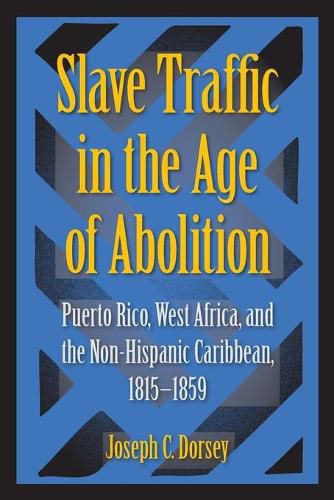Readings Newsletter
Become a Readings Member to make your shopping experience even easier.
Sign in or sign up for free!
You’re not far away from qualifying for FREE standard shipping within Australia
You’ve qualified for FREE standard shipping within Australia
The cart is loading…






This title is printed to order. This book may have been self-published. If so, we cannot guarantee the quality of the content. In the main most books will have gone through the editing process however some may not. We therefore suggest that you be aware of this before ordering this book. If in doubt check either the author or publisher’s details as we are unable to accept any returns unless they are faulty. Please contact us if you have any questions.
Drawing on archival sources from six countries, Joseph Dorsey examines the role of Puerto Rico in slave acquisitions after the traffic in slaves was outlawed. He delineates the differences between Puerto Rican and non-Puerto Rican traffic, from procurement in West Africa to influx into the Caribbean, and he scrutinizes the tactics–including inter-Caribbean traffic and conflation of African and Creole identities–by which Puerto Rican interest groups avoided abolitionist scrutiny. He also identifies the extent to which Spain supported these operations. Dorsey reconstructs the slave trade in Puerto Rico, devoting special attention to the maritime logistics of slave acquisitions–in particular the West African corridors and the nuances of inter-Caribbean assistance. He examines the evidence for the true origins of these slave populations and considers forces beyond European and American politics that influenced the flow of slaves. He explains the complex conditions of the Upper Guinea coast and illustrates the impact of social, political, and economic forces endemic to West African affairs on the Puerto Rican slave market.
Dorsey’s meticulous pursuit of evidence unearths the routes and institutions that brought thousands of slaves from West Africa into the eastern Caribbean, turning them into creoles in official records. In a radical departure from present Puerto Rican historiography, he demonstrates that Puerto Rico was an active participant in the illegal slave traffic and exerted a great deal of control over numerous components of the acquisition process, without exclusive dependence on the larger slave-trading polities such as Cuba and Brazil.
$9.00 standard shipping within Australia
FREE standard shipping within Australia for orders over $100.00
Express & International shipping calculated at checkout
This title is printed to order. This book may have been self-published. If so, we cannot guarantee the quality of the content. In the main most books will have gone through the editing process however some may not. We therefore suggest that you be aware of this before ordering this book. If in doubt check either the author or publisher’s details as we are unable to accept any returns unless they are faulty. Please contact us if you have any questions.
Drawing on archival sources from six countries, Joseph Dorsey examines the role of Puerto Rico in slave acquisitions after the traffic in slaves was outlawed. He delineates the differences between Puerto Rican and non-Puerto Rican traffic, from procurement in West Africa to influx into the Caribbean, and he scrutinizes the tactics–including inter-Caribbean traffic and conflation of African and Creole identities–by which Puerto Rican interest groups avoided abolitionist scrutiny. He also identifies the extent to which Spain supported these operations. Dorsey reconstructs the slave trade in Puerto Rico, devoting special attention to the maritime logistics of slave acquisitions–in particular the West African corridors and the nuances of inter-Caribbean assistance. He examines the evidence for the true origins of these slave populations and considers forces beyond European and American politics that influenced the flow of slaves. He explains the complex conditions of the Upper Guinea coast and illustrates the impact of social, political, and economic forces endemic to West African affairs on the Puerto Rican slave market.
Dorsey’s meticulous pursuit of evidence unearths the routes and institutions that brought thousands of slaves from West Africa into the eastern Caribbean, turning them into creoles in official records. In a radical departure from present Puerto Rican historiography, he demonstrates that Puerto Rico was an active participant in the illegal slave traffic and exerted a great deal of control over numerous components of the acquisition process, without exclusive dependence on the larger slave-trading polities such as Cuba and Brazil.